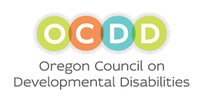“Question: I’m a teacher. How can I best support someone who uses Augmentative and Alternative Communication (AAC) to communicate in my classroom?”
 Right now, I’m taking an online class, “History of Religion in the United States since 1840.” It’s completely virtual, and I am able to take all the time I need to communicate as long as I turn assignments in on time. (And it’s important to me to be on time, even though I requested the accommodation to be able to turn them in late.) I do miss being on campus and getting to know other people. However, I am at a disadvantage because of how long it takes to spell a sentence. So a lecture-type class with limited open discussions would be a good option for me too.
Right now, I’m taking an online class, “History of Religion in the United States since 1840.” It’s completely virtual, and I am able to take all the time I need to communicate as long as I turn assignments in on time. (And it’s important to me to be on time, even though I requested the accommodation to be able to turn them in late.) I do miss being on campus and getting to know other people. However, I am at a disadvantage because of how long it takes to spell a sentence. So a lecture-type class with limited open discussions would be a good option for me too.
A lot of my experience has been in a third type of class: the discussion style format. They are centered around a presentation and followed up with small group discussions between students. I have found this format to be both great and frustrating: great due to being witness to conversations and getting to know other students, and frustrating not being able to compete verbally. I would often be ten topics behind by the time I finished spelling my response. It becomes tedious.
Another suggestion I would make is to provide a question to a class or group, and give your AAC user time to put together a few sentences while others speak their responses. However, if the rest of the class has the ability to share a few sentences, then please give me the same courtesy and don’t cut me off or shorten my words because it takes longer for me to communicate. I have experienced this for years, and have internalized an expectation to limit how often I live spell during presentations or classes.
 I know there are people in the audience who get tired of watching me point to each letter, and it distracts them from what I am trying to convey. So you might understand my shock and admiration to have watched a virtual presentation last week in which a speaker with CP [cerebral palsy] used his AAC device entirely for the entire hour and a half! I can’t imagine that he didn’t get the questions ahead of time… Really, I have been thinking a lot about that. I mean, if he had prepared his responses ahead of time, there would have been many more questions that could have been answered over the course of the whole presentation.
I know there are people in the audience who get tired of watching me point to each letter, and it distracts them from what I am trying to convey. So you might understand my shock and admiration to have watched a virtual presentation last week in which a speaker with CP [cerebral palsy] used his AAC device entirely for the entire hour and a half! I can’t imagine that he didn’t get the questions ahead of time… Really, I have been thinking a lot about that. I mean, if he had prepared his responses ahead of time, there would have been many more questions that could have been answered over the course of the whole presentation.
But as an AAC user, I completely know the price each letter cost him. I, too, know that we put in so much more work than speaking people to produce about the same information, yet our efforts are ignored, patronized, or don’t even occur because we are so undervalued as members of a community. So when I see someone take his rightful time and answer in a way that is natural and equitable in labor to a speaking person, it inspires me to look at the ways I have internalized neurotypical standards of communication.
I would encourage anyone who interacts with low- or non-speaking people to examine their own ableism and see how they can accommodate and make equity of information more normalized. For example, maybe we ought to mix it up a bit and start having at least one non-speaking person on a panel who takes questions and answers them the way they typically do at home or out in the community. Maybe the audience needs to be reminded how hard we work to achieve what most take for granted; maybe we shouldn’t have to fight to be heard when we have so much to say.
